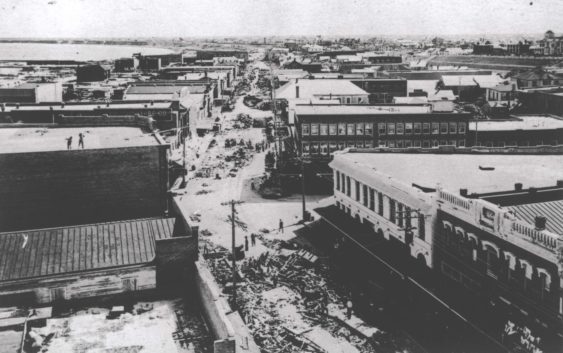- Caught on camera | Tornado touches down in Missouri
- Carolina Hurricanes playoff tickets go on sale next week
- Weather Impact Alert: Cold front could trigger severe weather in Houston area this weekend | See timeline
- Violent storms cut through the South and Midwest, spawning tornadoes and killing 3
- Above-normal active 2025 hurricane season predicted by Colorado State University
1919 Hurricane Demonstrates how Past Speaks to Present

CORPUS CHRISTI, Texas – To commemorate the 1919 Hurricane that ravaged the coastal city of Corpus Christi and claimed as many as 1,000 lives, the Texas A&M University-Corpus Christi Historical Forum along with the Mary and Jeff Bell Library hosted “100 Years After the Storm” on Friday, Sept. 13. The program, which was part of “Remember the Hurricane of 1919: 100 Year Anniversary,” featured guest speaker Mary Jo O’Rear, an Islander alumna, author, and historian along with a panel discussion led by faculty experts Dr. Lisa Comparini, Dr. Dan Jorgensen, Dr. Philippe Tissot; and Dr. Patrick Fitzpatrick acted as moderator.
“It was a shocker. Everyone in Aransas Pass, Rockport, and Corpus Christi thought that we were in a safe haven, but the 1919 Hurricane was a catastrophe that hit the whole Coastal Bend,” said O’Rear in her keynote address.
During the program, O’Rear spoke on the attitudes and myths surrounding hurricanes in the Gulf Coast in the early 1900s. According to her book, “Storm Over the Bay: The People of Corpus Christi and Their Port,” Coastal Bend residents living at that time felt immune to the devastating forces that threatened the Texas coast after remaining unscathed by hurricanes that severely affected Galveston and Harbor Island in 1915 and 1916.
“As scientists, we can give numbers, maps, and charts but curating stories of people who went through those events speak a lot more,” said Tissot, Conrad Blucher Institute Interim Director and Associate Research Professor at Texas A&M-Corpus Christi. “The books we discussed will allow people to better relate with how horrible these experiences were and realize they don’t want to be in the paths of storms like these.”
Before hearing an excerpt from O’Rear’s book, the panel discussed topics that ranged from emergency management and federal government intervention, to the tools and resources that are available to predict weather scenarios. Most importantly, the panel touched on mindsets that parallel the attitudes and myths in previous century.
“Constantly, there’s a push to say that we’re safer than we really are,” Tissot said. “I don’t know if it will happen in my lifetime, but there will be other big storms hitting Corpus Christi. The key is to constantly prepare yourself, have a plan and follow directions. Also keep in mind the saying ‘Hide from the wind, run from the water!’’”
Those wanting to learn more about the 1919 Hurricane can visit the unique photos and artifacts in the Special Collections and Archives of the Mary and Jeff Bell Library.